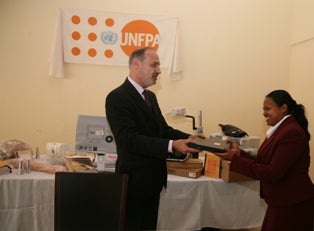There is just one midwife for every 18,800 women of reproductive age in Ethiopia, and a new capacity gap assessment has found a significant need to improve the quality of training both for those who currently practice and for those attending midwifery training institutions.
The assessment, conducted in midwifery training institutions in Haromaya, Mekelle, Hawassa and Gonder Universities; in Hawassa, Mekelle and Harari Health Sciences Colleges; and of the Ethiopian Nurse Midwives Association was released at a half-day meeting on July 30, organized by UNFPA.
"Not only is the number of midwives very small in Ethiopia, but the trainers who train them and the institutions they were trained in are not well equipped to pass on the skills to save women's lives," noted Dr. Francois Farah, UNFPA Representative a.i.
The assessment report revealed that fifty percent of the tutors at the midwifery schools are new graduates with neither the adequate skills nor the clinical experience to teach and supervise students. Tutor-student ratio peaks at 1:53 in some schools, and one class can have as many as 137 students. Moreover, midwifery departments in the universities do not have their own demonstration rooms or independent budgets for programme management, the report states.
"The assessment found a substantial capacity gap, and this only strengthens UNFPA's commitment to work with all partners to reduce maternal mortality," Farah continued. On behalf of the Fund, he handed over to representatives of the midwifery training institutions equipment valued at over USD 75,000 -- laptops, overhead projectors, printers, LCDs, mannequins, manuals, and books.
The event was part of the UNFPA/ International Confederation of Midwives (ICM) Global Midwifery Programme, which
targets 10 African, 5 Asian and 5 Latin American countries. Ethiopia is one of the countries in which the programme will focus on providing high-quality midwifery education, strengthening the role of professional midwifery associations, developing midwifery standards and monitoring systems and improving quality of midwifery practice.
Ethiopia has just 1,244 Midwives to serve a population of 73.9 million people, yet WHO recommends a ratio of no less than one midwife per 5,000 people (WHO). Another 14,780 midwives are required to meet the national needs.
Representatives of the midwifery schools, UN agencies, and implementing partners attended the meeting.




